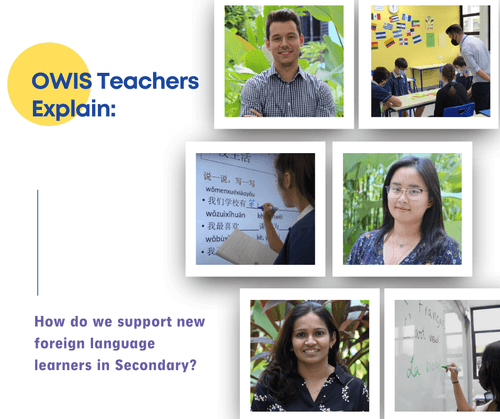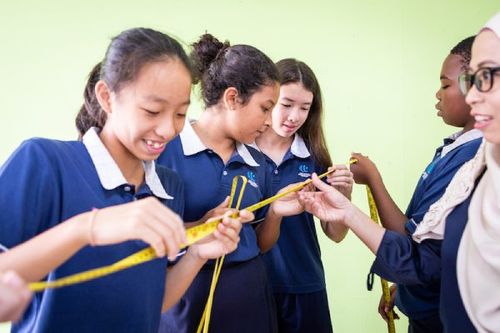At One World International School, foreign languages are an integral part of our future-focussed IB and IGCSE curricula. Learning a foreign language has several cognitive benefits for children, such as improved memory and concentration. It also opens up their options when they reach university and later in their career.
Right from Early Childhood onwards, we provide students with the opportunity to learn Mandarin, one of the national languages of Singapore and a widely-spoken language in the world. In Primary School, families can choose to make the study of Mandarin a little more intensive and immersive by opting for our Chinese-English Bilingual Programme.
In Secondary School, in addition to Mandarin, we offer students two more foreign languages as subjects in the Cambridge IGCSE and IB Programme levels – Spanish and French. These courses are differentiated for learners who are completely new to the language and those who have some background in it.
Ms. Chang Liu, Head of our Mandarin Department, explained that levelled learning plays a key role in supporting Secondary students who are new to the foreign language.

“We have a baseline assessment to see where the students are, and we divide them into phases based on what they know. This way, we can adapt and personalise our instruction for them. So the topic is the same across phases, but for a beginner who is new to Mandarin, the content is easier in Phase 1. We guide them with the pinyin and the reading and writing is much easier. In another example, our IB DP Chinese B students, who have some prior knowledge, receive higher challenges.
We encourage beginner students to initially work on skills that they show prowess at, such as reading. And slowly, the speaking skills start picking up. Within one classroom, we have different types of students, so differentiated instruction is key. To maintain their interest, we don’t stress them out. We build up their confidence and then later, help them to advance.”
The focus in the teaching and learning approach for foreign languages is to build relevant practical skills, which will be of use to our learners after they leave OWIS. So our learners have the proficiency to consume media content in the language and speak confidently, and they also gain an appreciation of the related culture and its traditions.
Students who are new to French have the option to take it up at the Ab Initio level in the IB DP. Ms. Helani Weerasinghe, who teaches French at the Secondary School level, says that exploring the culture of the region makes the subject interesting for students.

“To make learning fun, we use interactive exercises, such as conversations, role play, songs, poetry, and acting out plays. We also encourage project-based learning by asking students to research and find out about French culture, such as the cuisine, comics, festivals, etc. It helps them to develop student autonomy, critical thinking and take responsibility for their own learning.
By presenting their findings to the class, students practise their speaking skills in French. Working in groups and pairs permits them to practise the language without much pressure, and it’s an excellent opportunity for peer learning. Exercises, such as filling in the gaps in the lyrics of French songs, help them practise listening comprehension.”
Mr. Javier Calvo, who teaches Spanish in Secondary grades, firmly believes that oral communication is what works best for building linguistic proficiency in learners who are new to the language.

“For students who take up Spanish Ab Initio in the IB DP, the learning has to be step by step, and I always advise them to practise speaking the language, even for something like grammar. They have to speak because that’s the best way to learn. If you learn basic grammar, such as verbs in present tense, and you write it down but you don’t use it orally in a sentence, you won’t be able to actually gain the required fluency.
We have to work with students on an individual basis. For example, if the student comes from a Bahasa or Hindi background, these are phonetic languages, like Spanish. It could be easier for them to pick up Spanish, pronunciation-wise. If they come from a Chinese or Japanese background, it could be more difficult in terms of reading and expressing themselves. In that case, we as teachers focus on their individual learning needs.”
All three teachers concurred about the usefulness of technology and multimedia content to make learning engaging for older students. From apps like Kahoot, Socrative, Padlet and Quizlet, to multimedia content such as listening to radio stations or watching foreign language shows and movies, there are different ways in which students start to enjoy picking up foreign languages at OWIS.
All the teachers gave the following suggestions that international families can employ to help their children in their learning journeys:
- Reading is a good habit to develop vocabulary and writing skills. Families can visit the library and find children’s books and magazines in the target foreign language. Ask the child to read a book in that language and relate the story to the parents.
- If parents don’t speak the same foreign language, they can try to learn the basics with the children. At the beginner level, it is very easy.
- Practising Mandarin is easy in Singapore because there are so many speakers in the local community. Children can be encouraged to practise their Mandarin when the family goes out, such as at the shopping mall or the hawker centre.
At OWIS, we focus on supporting the needs of our Secondary students to help them to gain breadth and depth of knowledge, and achieve their academic goals. To find out more about our Secondary School programmes, please contact our Admissions Team or join our school tour.














